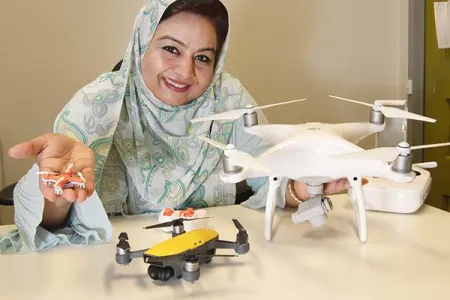Drone-based STEM project attracts $48K grant
Charles Darwin University Lecturer in Education (Mathematics) Dr Farha Sattar has received a $48,000 grant to further a project in which she uses airborne drones to accelerate STEM education.
Dr Sattar said STEM subjects were an “educational hotspot” because recent statistics showed a decline in Australian students wishing to undertake STEM courses, particularly in science and mathematics.
“We (STEM educators) need to take the initiative to do something to improve this area of teaching and learning,” she said.
“Traditional teaching methods are not catering sufficiently for the outcomes we expect from various school and higher education levels, especially in the context of the rapid advances in digital era technologies.”
Dr Sattar said students needed to be provided with a “multiple-pathway” approach that encouraged critical thinking and reasoning, and did not rely on a “linear learning process”.
“Using current pedagogies, there is an experiential gap between theory and practise, and to bridge that gap we have to engage students in activities that give them hands-on experience,” she said.
“In this sense I see drones as having tremendous potential as an educational tool.
"There are so many different types and purposes for drones these days that we can find a drone that is appropriate for use by the youngest children in primary school, to increasingly sophisticated machines that are being used progressively in the STEM sectors of national economies.”
Dr Sattar’s “Rainmaker Readiness Grant” is funded by the CDU Institute of Advanced Studies, whose primary aim is to encourage multi/cross-disciplinary advanced studies within the university, as well as providing leadership and professional development for researchers, research students and other CDU innovators.
